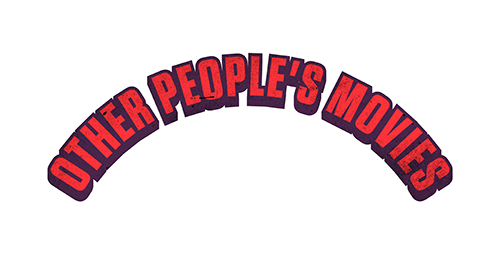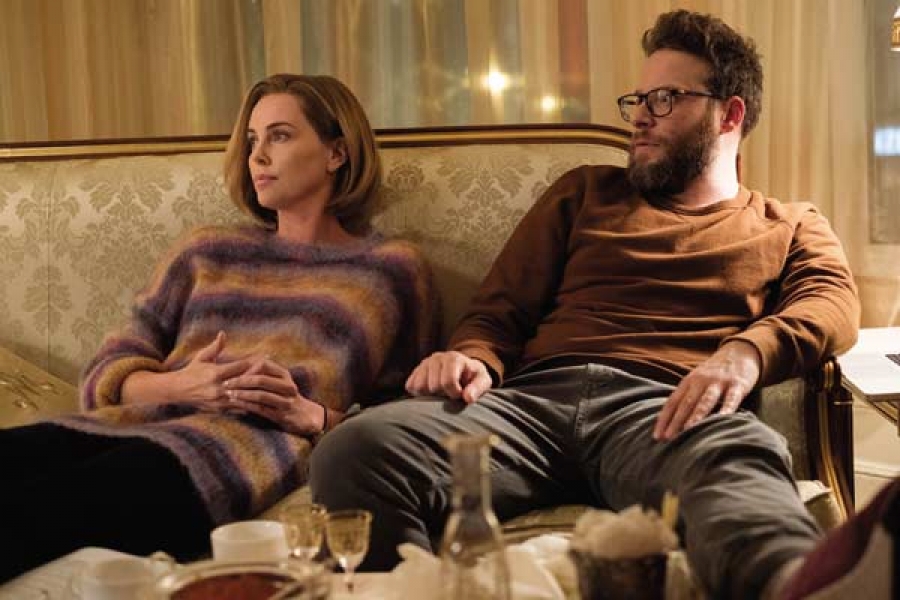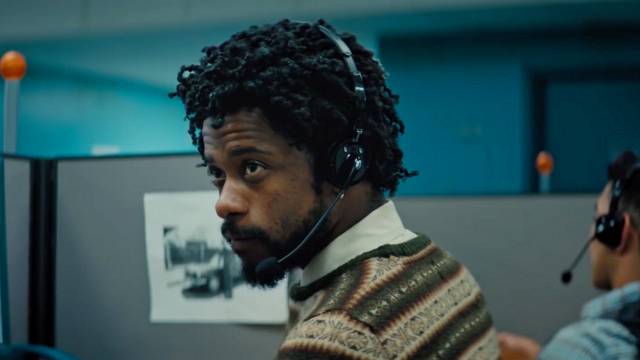
We have already thoroughly detailed Allison Burnett’s life and career. To briefly summarize, he’s a professional screenwriter who also works as a novelist and independent filmmaker. He’s the rare artist who has found creative and financial success—though rarely with the same project.
Burnett recently published his seventh novel, The Ghosts of Normal, and directed his third feature film, Another Girl. We had the opportunity to talk with Burnett shortly before Another Girl’s digital release on Sept. 14. We discussed his recent works, his life during Covid and what’s on the criminally under-known auteur’s horizon.
Thanks for taking the time to talk, Allison! How have you and your family held up during the pandemic?
By overdosing on carbs. Okay, that was a joke, but I think when I look back on this terrible period, what I’ll remember first was the nightly ordering from Postmates. Too demoralized and anxious to cook – or, God forbid, shop, which we left to Instacart – my girlfriend Jessica and I fed my sons, now 13 and 15, from the same dozen or so local restaurants night after night. We all craved the same thing: comfort foods.
Hands down, the worst part of the plague (aside from the fear of painful death) was the home schooling. My kids learned almost nothing from it as far as I can tell, except how to play Minecraft during math class. Now that they are both vaccinated, I can’t wait for in-person school to resume.
As for myself, I continued to build my ephemera collection via eBay and other on-line auction houses and somehow managed to stay creative, finishing the film version of Another Girl, publishing a middle-school novel, and writing a spec romantic comedy.
What movies and television series have recently held your interest?
Jessica and I joke that our brand as a couple is 1970s films and True Crime. And that’s fairly accurate. During the pandemic, we watched dozens of great movies from the 70s, and watched at least 200 hours of Snapped. I am not sure why, but nothing calms my chronic anxiety quite like a deep dive into spousal murder.
I saw that American Night was produced. You were listed as a screenwriter for it on IMDb for the longest time, but now your name is no longer on the project. What happened there?
I was hired to write the screenplay by an Italian film company. The movie that resulted bore absolutely no resemblance to my script. I did not even bother to arbitrate for a credit.

As we covered in your retrospective, your Max screenplay launched your career yet never reached production. What made you want to adapt that particular script into your latest novel, The Ghosts of Normal, thirty years later?
For decades, Max was my calling card. In the beginning it got work for me and my writing partner (whose name I had put on the cover page to thank him for all he had done to facilitate my move to Hollywood). Later, I rewrote it and gave it a new title, and it garnered me even more work, earning me a down payment on a house. And yet for various reasons, it never got made – too small, they said, or too dark or too grown up…. Finally, I decided that before I dropped dead, I would write it as a novel, so that it might live on after I am gone, accessible to kids everywhere.
Why did you decide to self-publish The Ghosts of Normal?
The world of children’s and middle-grade fiction is tightly guarded by book reviewers, and by the librarians who do the ordering. There are strict, unwritten rules that must be obeyed. This was explained to me by a big Manhattan editor to whom my book had been submitted. She told me that she greatly admired the writing, but that unless I rewrote the book, adapting to these unwritten rules, she could not publish the book — and she was fairly certain no one else would.
The changes involved taking the young reader by the hand and explaining, before they occur, the adult situations and darker themes of the story. When I assured her that I had already given the book to middle-school readers and that they had loved it, and that none had been confused or traumatized by it, she said that the children of my sophisticated friends didn’t count. I needed to protect the average American child.
Rewriting my beloved story this way was simply untenable to me. Screenwriters compromise their vision with every keystroke. I write novels to be free of all that. So, I decided to self-publish it, just as I had my novella, Another Girl. A choice I do not regret. The story remained intact, and I got to keep almost all the money. No corporate wall between me and my readers. And, who knows, it still might become a movie someday.

What made you decide to adapt your own novella, Another Girl, and pursue it as your next directorial project?
It was a natural progression. Ask Me Anything was doing well on Netflix, and here I had this novella perfectly suited to be a film….
As a screenwriter, you’ve adapted other novelists’ work. Do you find that adapting your own work is easier or harder than adapting someone else’s—or is it a similar process?
The central imperative when adapting any work to the screen is that you remain as loyal to the source material as possible, but not a bit more. When you reach a crossroads between loyalty to the source material and making the screenplay as good as possible, you must choose the film every time. This sort of ruthless discipline is much easier when one did not write the source material. In short, it’s easier to kill darlings when they are not your own.
Another Girl is a continuation of your previous film, Ask Me Anything, which is based on your book, Undiscovered Gyrl. How much of a sequel to Ask Me Anything do you actually consider Another Girl to be?
I think it is very much a sequel, but, lucky for me, as so much time has passed since Ask Me Anything, it also functions quite well as a stand-alone movie.
I would love to write a third book and make a third movie. The rule of threes, right? But to do this, I would have to feel that there was some sort of demand. After so much time, that remains to be seen. Not many trilogies take a decade to complete.
Another Girl is quite challenging material. How difficult was it to get the project off the ground, and how did you do so while still maintaining artistic control?
When the novelist is also a screenwriter/director with a decent track record and the budget is a mere 600K, it’s not that hard to demand artistic control. The difficult thing is getting the 600K in the first place. But, these days, funding is almost impossible for any indie movie, because the path to recoupment is so uncertain.
In this case, the financing took me years. Another Girl’s real path to production didn’t even begin until December of 2017, when a total stranger living in Oklahoma, named Bryan Patterson, messaged me on Facebook, asking, “Will you be turning another one of your books into a movie?” Bryan introduced me to an LA producer he’d also met on FB, and thus began a daisy chain of associations that led me to Rocky Lai, the wonderful financier of Another Girl.
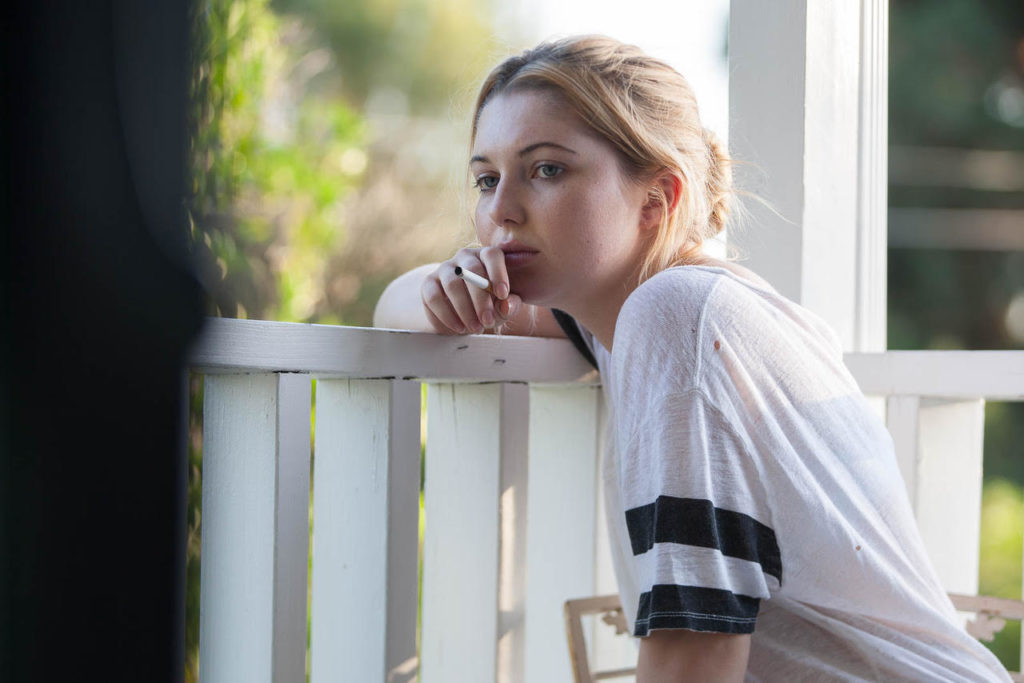
Sammi Hanratty is fantastic in the film. The film’s weight truly rests on her shoulders, and she carries it with the appearance of ease. How did you find her? How was your working relationship?
I was looking for an actress who was smart, sexy, soulful, emotional, effortlessly charming, and deeply sympathetic. A tall order in Los Angeles. I auditioned many young women. As the first day of shooting neared, I was becoming more and more panicked. Then, out of the blue, Sammi sent in a self-audition tape. It took me about thirty seconds to know I had found my Elle. Working with Sammi was a joy. She’s been acting since she was a kid, so her technique is breathtakingly good. The constraints of our budget put her under extreme pressure. Rarely did we have time for more than a few takes of any scene, and yet she delivered time and time again. Can you tell I’m a fan? She was a dream come true.
Did you have any time for rehearsal on Another Girl? How do you feel about rehearsal in general?
I love rehearsal but it’s a luxury most indie films cannot afford. I got about an hour with each main character and about eight hours with Sammi.
One great thing that came from rehearsal essentially saved the film. Originally a different actor was hired to play Elle’s brother, Connor. When things didn’t go well in rehearsal, I added an extra Sunday-night work session at a local theatre. A worker from the theatre unlocked the doors for me and the producer.
The work session went badly. I knew the actor I had cast was simply unable to give me what I wanted, and yet, barring a miracle, there was no time to recast the role. Minutes later, as the producer and I were let out of the building, we simultaneously took a closer look at the worker with the keys. “I don’t suppose you’re an actor?” I asked him. He said he was. Ten minutes later, after a quick cold-read, Paul Rush had landed his first movie role.
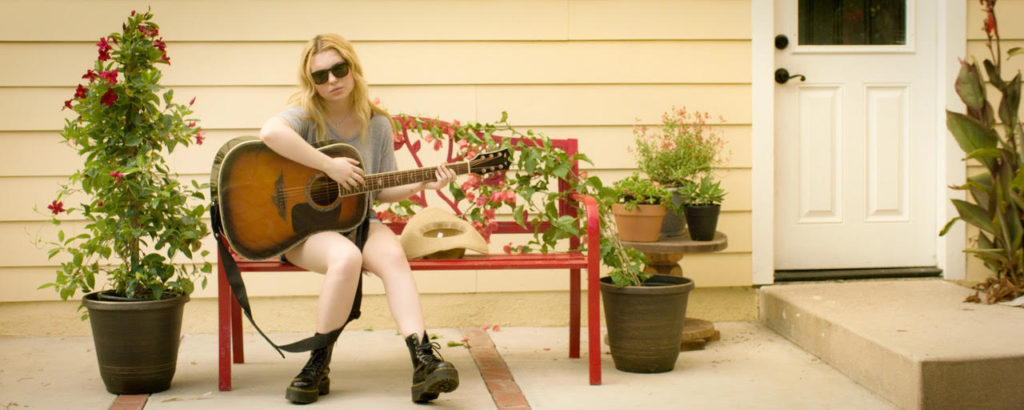
Do you consider yourself to be a hands-off or hands-on director? What areas would you say you’re most controlling over? What areas do you provide the least amount of input?
I’m hands on wherever and whenever I can be. I like to come into my first meeting with the cinematographer with a shot-list in hand. Of course, it’s all a collaboration after that, but at least I have a clear vision before our work begins. You would not believe how this delights my DP’s. So many directors have little interest in the visuals. My deepest pleasure, however, comes from working with the actors. No standing passively at the monitor for me; I’m at the actor’s ear between almost every take.
When you are directing a movie, do you still allow time for writing? Or do you hyper-focus on the film and give writing a break until it’s complete?
I do nothing else creative until well into post-production. Only then might I find time to write again.
What are you working on, now?
I just put the finishing touches on a wedding romantic comedy called Meet Me at The Altar. One of the best commercial scripts I’ve ever written, I think. I also just finished collaborating with a younger writer on a half-hour animated pilot, called Werner. Trapped in movie jail, Werner Herzog comes to a small American town in order to reacquaint himself with the Common Man. As a director, I’m trying to launch an adaptation of The Ghosts of Normal.
Thanks so much for taking the time to talk, Allison! Best of luck with Another Girl’s release!
Thank you, it was a pleasure.
